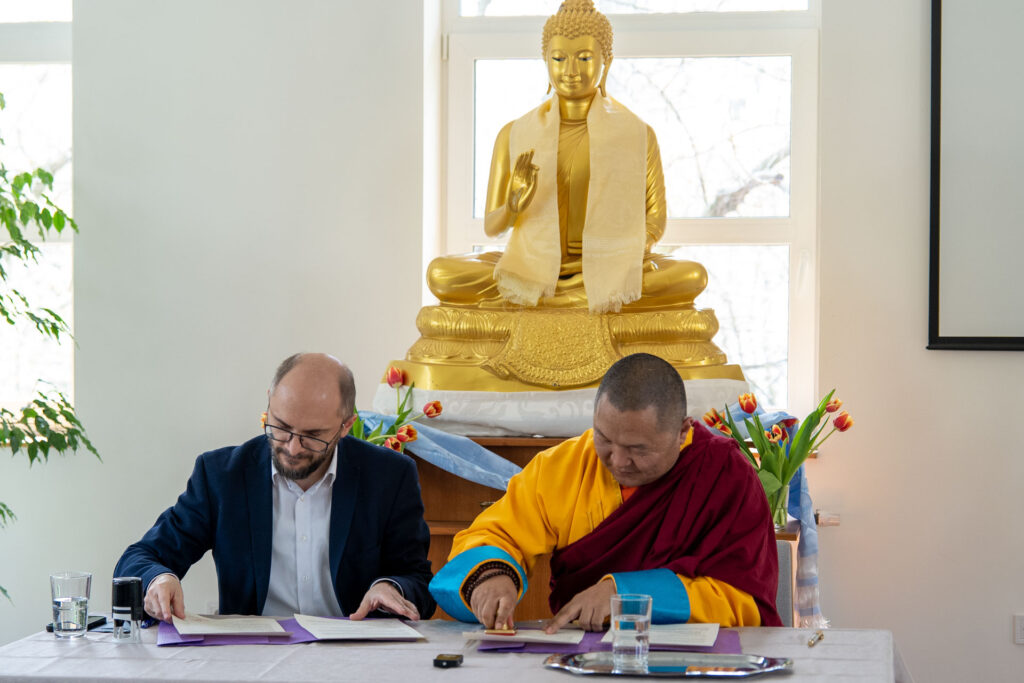
- Hírek
Együttműködési megállapodást írt alá A Tan Kapuja Buddhista Főiskola és a mongóliai Zanabazar Buddhista Egyetem (ZBU).

Citizens from Non-EU (European Union) and Non-EEA (European Economic Area) countries have to apply for a long-term visa or residence permit before their arrival.
International students are highly recommended to consult the relevant authorities at least 2 months before the beginning of their studies. Upon receipt of the Invitation Letter/ Letter of Acceptance from the College, students from non-EEA countries must hand in their demand on residence permit for the purpose of studies at the Hungarian Embassy in their home country. In case of successful application, the students obtain a visa authorizing them to a single entry for receiving the residence permit and to stay for maximum 30 days in Hungary. The decision on the residence permit falls within the scope of the regional directorates of the Office of Immigration and Nationality. The students must visit the Office of Immigration and Nationality and obtain their residence permit within 30 days from the day of entry.
All non-EEA nationals must, at all times during their stay and studies here, have a valid residence permit allowing them to study in Hungary. Those international students who are staying at DGBC for a longer period of time are obliged to have the residence permit renewed before it expires. Please note that renewal of the residence permit must be started at least 30 days before it expires.
Citizens from the European Union and the European Economic Area "have the right of residence for a period exceeding three months if: … they are enrolled at an educational establishment governed by the act on public education or the act on higher education, for the purpose of studying,…" – according to the ‘Act I of 2007 on the Entry and Residence of Persons with the Right of Free Movement and Residence’.
For those who stay in the country for more than 90 days registration is compulsory at the regional offices of the Office of Immigration and National Services.
All international students are also responsible for registering their housing address at the regional directorate competent for the place of residence. In general, all international students have to notify the authorities about their place of residence soon after arrival and within 3 days after any changes taking place.
More information can be found on the website of the Ministry of Foreign Affairs or at the Embassies and Consulates of Hungary based in your home country.
The current legislation and procedures can be found on the webpage of the Office of Immigration and Nationality as well.
We are not able to organize accommodation for our incoming students. You can find accomodation, book a room on the following www sites:
The experience with the companies is good, but please note:
The content of such third party sites is not within our control, and we cannot and will not take responsibility for the information or content thereof.
Students can obtain an International Student Identity Card online and at the local offices of the ISIC. There are many advantages of an ISIC card, e.g. you are entitled for many discounts. We advise to arrange an international student ID card before your stay abroad.
More information can be found on the ISIC.org
However our institution can not issue a traditional student ID, our coordinator will give you a certificate about your student status.
Citizens and/or residents of countries, which are not part of the European Economic Area and which don’t have bilateral agreements with Hungary on the provision of health care, have to pay full price for the health care services rendered in Hungary.
All international students are recommended to insure themselves in their home country. Valid health insurance for the duration of your stay in Hungary is obligatory (if your health insurance card does not specifically state that it is valid for EU member states or that is valid specifically for Hungary, please ask your insurance company to supply you with an official letter to this effect as the Hungarian Immigration Authorities may need this statement when you arrive to Budapest). The health insurance must provide full coverage; emergency health insurance will not be accepted.
Find more information about the regulations HERE:
The use of ATM machines is common in the country; cash can be withdrawn at post offices as well. It is necessary to pay attention which ATM you use, because ATMs not affiliated with your bank can charge higher commissions. Furthermore, you can change money in banks or private money exchange offices. Exchange rates may vary so you are advised to check them in advance. They are always available on websites of banks as well. Smaller shops also accept bank cards and paying with paypal is becoming more and more widespread, mainly in the capital and in larger cities. Banks are usually open from 8.00 am to 16.00 pm. At weekends and on national holidays banks are closed.
Exchange rates:
Budapest Liszt Ferenc International Airport (BUD), formerly known as Budapest Ferihegy International Airport, is about 10 miles from the city centre. Budapest Airport had two main terminals: T1 and T2, but Terminal 1 is closed since 2012. Terminal 2 is divided into 2A and 2B. 2A serves flights to/from Schengen countries and 2B serves all non-Schengen destinations.
Both terminals are accessible by public transport. Buses run between Kőbánya-Kispest (KÖKI) metro station and the airport. The ride from the metro station to Terminal 2 takes about 30 minutes.
Budapest is a lucky town regarding public transportation. Due to its developed public transport network, all parts of the city are easily accessible. More than 180 bus, 14 trolley, 29 tram and 4 metro lines are at your command.
Tickets are mostly unavailable on the vehicles themselves, you have to buy them in advance, at the ticket office. Tickets are valid for the metro, buses, trams, trolley buses, ships, the Funicular and the suburban HÉV lines (only within the city limits). The basic ticket is good for one trip; if you transfer, you will need to validate a new ticket or use a transfer ticket. Be sure to validate your ticket before you start your journey. You can buy single tickets, transfer tickets or get a discount with a 10-trip coupon book, which contains 10 single tickets. There are passes available for longer periods but they do require ID card, Student Card, ISIC… Buying a Budapest Card is recommended, as it allows you to use all kinds of public transport, plus get lots of other discounts as well. Regular public transport is from 5 am to 24 pm or midnight, during the night there are several night lines throughout the city.
Ticket prices:
Android application: search for ‘BKK INFO’ in Google Play.
BuBi- Budapest Bike:
From spring 2014 it will be possible to use public bicycles in the city centre of Budapest.
Budapest taxis
Taxis can be fast and cheap in the city, especially late at night when there is limited public transportation. Taxis can be hailed on the street, but it is cheaper to call in advance. According to a new taxi regulation passed by the Municipality of Budapest, starting September 1st 2013, all licensed taxi drivers must adhere to a new fare structure and charge the same price.
Avoid getting in taxis with no name or logo, or ones queuing at hotels and railway stations.
Some recommendations:
The country has a capital-centred network of bus and train lines. You can buy student ticket with your temporary Hungarian student card or get a discounted prize from Friday till Sunday if you are under 26 ages.
International Phone Calls
To make an international phone call, dial: 00 or +, country code, area code, local phone number.
Mobile/Cell phones
There are 3 major companies, which provide mobile phone services.

Együttműködési megállapodást írt alá A Tan Kapuja Buddhista Főiskola és a mongóliai Zanabazar Buddhista Egyetem (ZBU).
A Tan Kapuja Buddhista Főiskola pályázatot hirdet hallgatók számára Erasmus+ szakmai gyakorlat mobilitási programban való részvételre 2025 nyarára és 2025/2026. tanév őszi félévére. A mobilitás